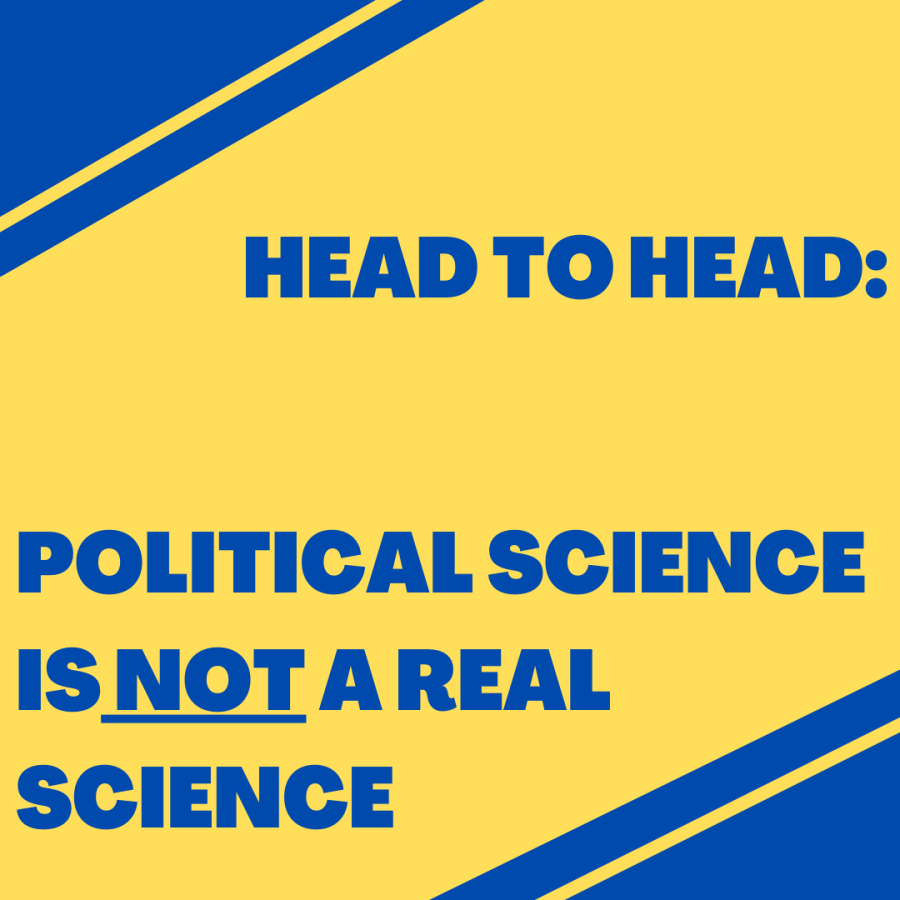Head-to-Head: Political science is NOT a real science
Editor-at-Large, TJ Lindstrom, discusses why political science is NOT a real science.
Feb 6, 2023
This column is part of a “Head-to-Head” series. Read the counterargument by Laken Kincaid.
I often joke that I study political science and data science –– the two fake sciences. It’s not that funny of a joke, but you get the point. In the STEM-dominated culture, tacking the word “science” on to the end of a field lends it some credibility and maybe spares it a few dollars after the next round of budget cuts. However, I wonder if we do more harm than good by considering the study of human society (what we usually term “social science”) a science.
First, to deal with the semantic elephant in the room: the argument that political science is not a science seems to contain a bit of an internal contradiction. The most astute reader might ask, “but isn’t the word science right there, in the name of the thing?” Ah, yes, very clever, very clever indeed. But, that the name of the vast field of study, by mere convention, contains the word science is exactly the confusion I intend to dispense with here.
So, then, what is a science and why should the sign hanging above the Political Science department be, instead, used as fire kindling? For the purpose of this column I will rely on the Oxford Dictionary definition of the word: “knowledge about the structure and behaviour of the natural and physical world, based on facts that you can prove, for example by experiments.” This definition contains three essential elements. First, science studies the natural and physical world. Second, science is objective and empirical. Third, science relies necessarily on the scientific method. Below, I show that each of these elements is missing in political science.
Since the dawn of Western thought, some of the greatest thinkers of each era have devoted serious thought to politics. One of the founders of political philosophy –– and, indeed, most of Western philosophy –– Aristotle studied politics closely. For most of academic history, the theory of politics was regarded as just that: theory, philosophy. It wasn’t until Darwin put forth his earth-shattering theory of evolution that the concept of a social “science” began to emerge. If human beings are just chemical and biological organisms like the rest of the animal kingdom, the argument went, we can study their behaviors the way we would study molecules or fruit flies. Thus began the behavioralist revolution. Modern social science –– including political science as a discipline –– arose out of this thinking. But critiques of this method of inquiry quickly emerged.
To return to our definition of science, first, the unit of analysis in political science is never “natural” nor “physical.” Sure, most scholarship involves human beings, but the central thing to be studied must be an idea. This is true because politics does not exist in any metaphysically real sense. It is a process that human beings experience, conceptualize and enact. In political science, our objects of study –– states, courts, elections, politicians, etc. –– are human constructions; they simply cannot be observed as physical objects under a microscope.
Second, while many political scientists use empirical measures and insist on objective discussion of these measures, the scientists themselves cannot be objective. Assuming they exist as human beings in the world (and as far as I can tell the entire JCU Poli Sci faculty do exist as human beings in the world…save, perhaps, Dr. Ziemke), political scientists are themselves political agents experiencing, conceptualizing and enacting politics. Sure, they may be intellectually objective but, at some point, as a necessary condition to conceptualize what it is they are even studying (i.e. a human construct), they must rely on some subjective judgment.
Take for instance, the recent trend of male, white, non-college educated voters leaving the Democratic Party. One can observe an increased positive statistical correlation between this demographic category and Republican party affiliation. However, the construction of the fundamentally arbitrary category (male, white, non-college educated) requires a subjective judgment in selecting the characteristics which might be related to party affiliation.
A political scientist, as a person in the world, has some intuition about which categories might be related to party affiliation. They arbitrarily pick out these categories (categories which, I might add, are themselves arbitrary…what counts as non-college educated?…no college education at all?…less than four years of college?…less than two years?…what about someone who dropped out after a month?…or someone who dropped out a month before graduating?…are they college educated?) and they throw these categories into a statistical model. Now, I am not disputing that these findings are interesting and valuable to society, but to pretend that this is science is nonsense. Rather, it is a subjective judgment based on some empirical relation. Interpretation of such a relation inherently requires some subjectivity, else it would be meaningless at any level of analysis humans can comprehend.
Finally, as the example above shows, while something like the scientific method is often applied to political hypotheses, it does not have to be. We can discern many interesting relationships by using this method in political science. But whole subfields of political science do not rely on the scientific method at all, nonetheless these subfields are equally valuable to the discipline. Most theorists, for instance, do not rely on the scientific method at all nor do many legal scholars in the field. While it is remarkably difficult to establish causal relationships in political science, the use of the scientific method in observational circumstances remains a very valuable tool. But that is all that it is: a tool, a conceptual frame, a method. The scientific method is not essential to most political analysis.
You might say that this is all semantics. Who cares if we call political science a science or something else? Indeed, the work being done in the field is far more important than what the field itself is called. But that does not mean the label of the field is meaningless. We label things for a reason. Labels help us understand what we are doing with ourselves, they help others glean some understanding of what we are doing and, in doing so, they shape the labeled thing itself.
The term “science” succeeds the word “politics” to give the field an air of scientific objectivity. But this is a problematic reduction. Politics are not objective and that is exactly the point. If we consider politics as just any other field of scientific inquiry we risk missing the human element of politics. Science regards its subjects as complete, finite objects. But, human beings and their experiences are infinite and incompletable. In a way, this is exactly what makes us human ––the infinite dimension of self. To reduce human beings to billiard balls bouncing around on the political pool table misses the point. It misses the reality of values, personality and our common humanity at the center of all our political questioning; things which are definitionally unscientific!
Studying politics is one of the most rewarding things an academically minded person can do. As a major, I have drawn on theories and methods from just about every other academic discipline. That is what makes the field so dynamic: that it is inherently interdisciplinary. By rejecting the science of political science, I do not intend to disparage the field. On the contrary, I think it vitally important not to reduce this complex, dynamic and so very human exercise to mere science. It is much too important and complicated for that.















Laken Kincaid • Feb 8, 2023 at 3:52 pm
Well said!